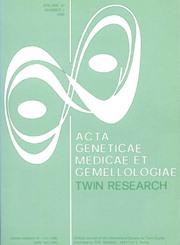No CrossRef data available.
Article contents
An Introduction to Genomic Imprinting and Parent of Origin Effects
Published online by Cambridge University Press: 01 August 2014
Extract
Recent developments in molecular genetics and cytogenetics have allowed for better understanding of the inheritance and expression of genes. Many newly recognized mechanisms such as genomic imprinting, mosaicism, allelic expansion, cytoplasmic inheritance and uniparental disomy have been recognized to play an important role in human heredity.
Genomic imprinting refers to differences in the phenotype which are observed depending on whether the gene was inherited from the father or from the mother. Genomic imprinting is a difficult concept to understand because imprinting has been used loosely to refer to a number of different mechanisms including psychological development, endocrinological actions of cells and protein-protein interactions. Genomic imprinting produces parent-of-origin effects. Parent-of-origin effects is a term that encompasses many of the non-traditional types of inheritance and other genetic and non-genetic mechanisms which show an effect depending on whether they were paternally or maternally derived.
- Type
- Research Article
- Information
- Acta geneticae medicae et gemellologiae: twin research , Volume 45 , Issue 1-2 , April 1996 , pp. 59 - 61
- Copyright
- Copyright © The International Society for Twin Studies 1996


